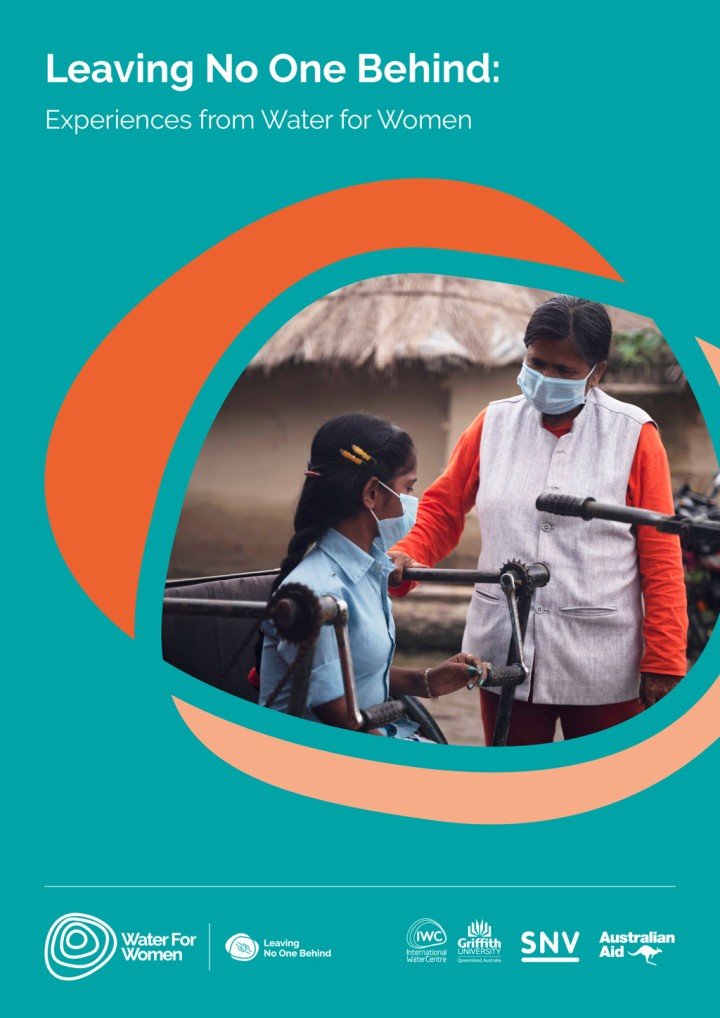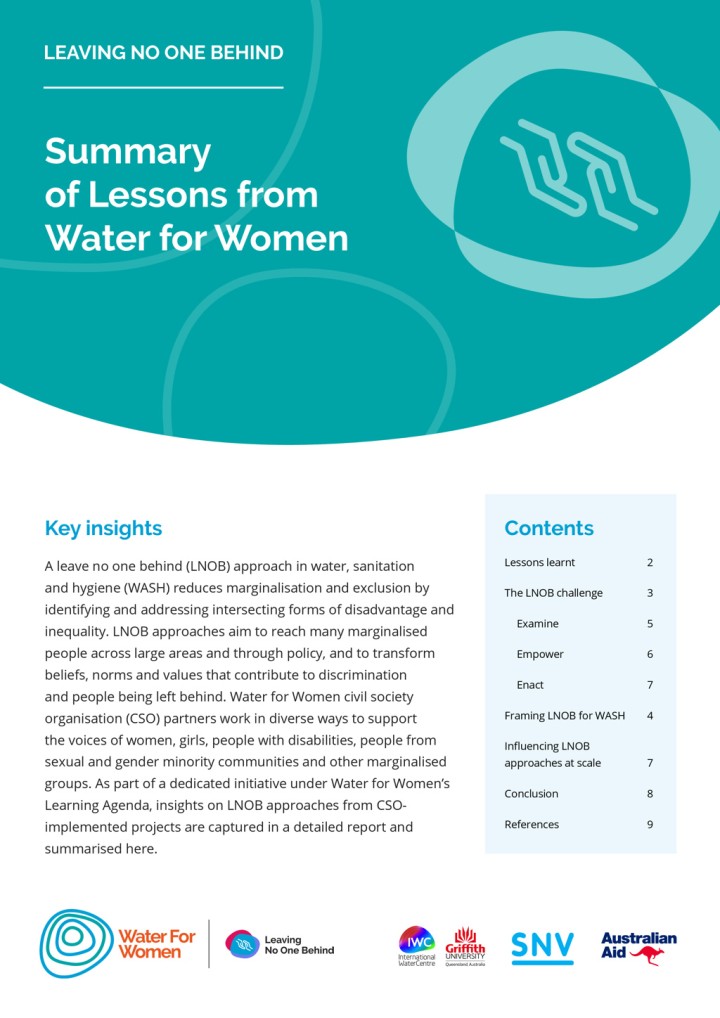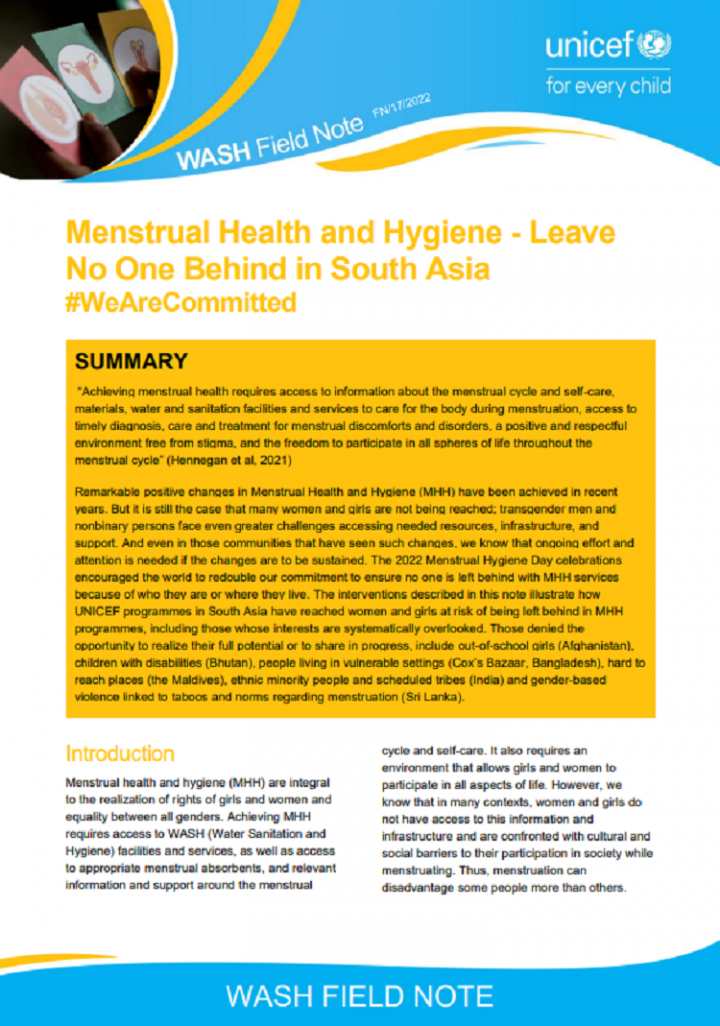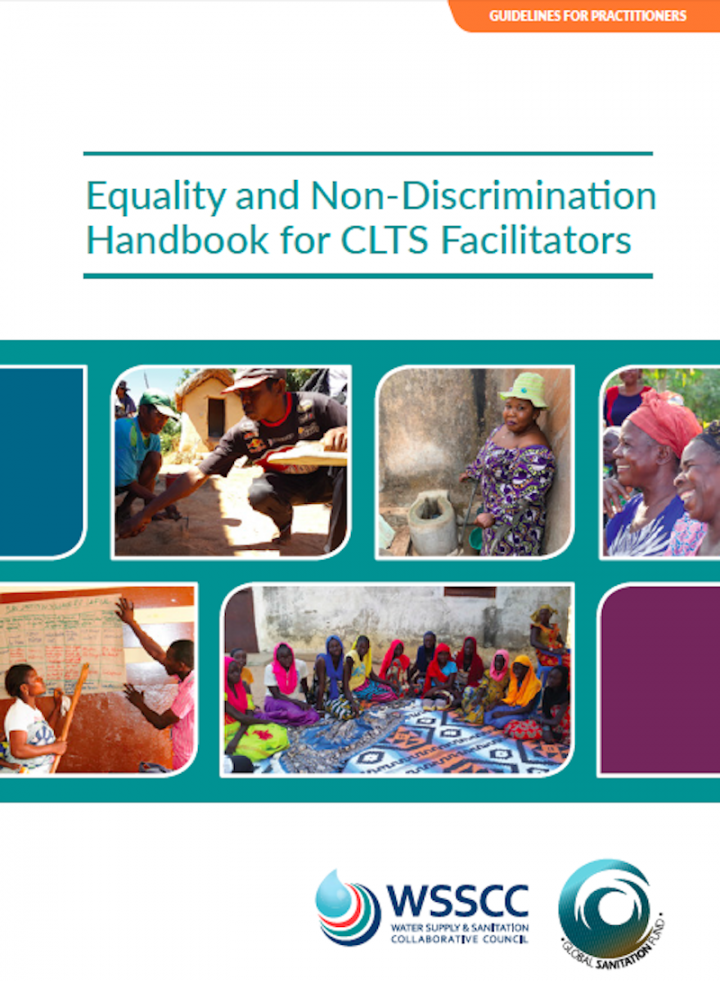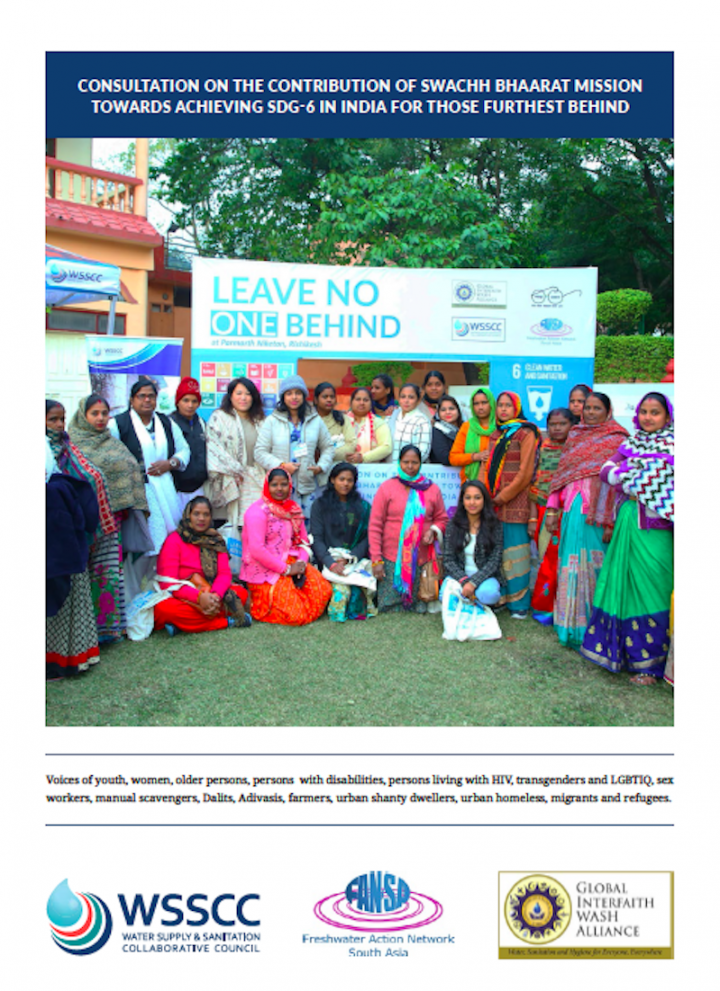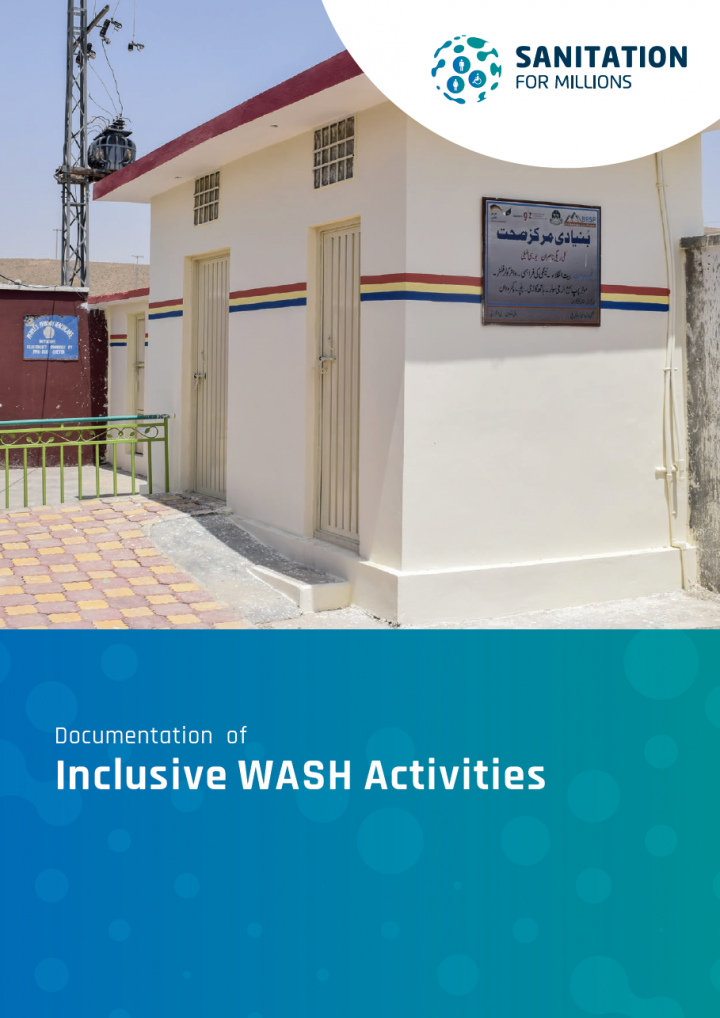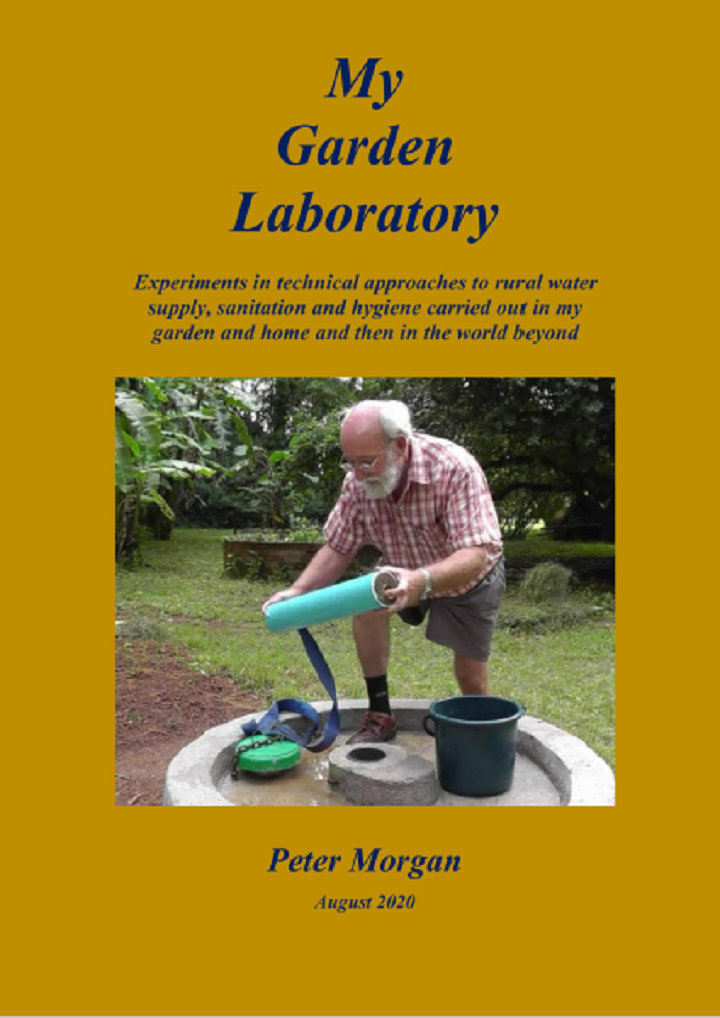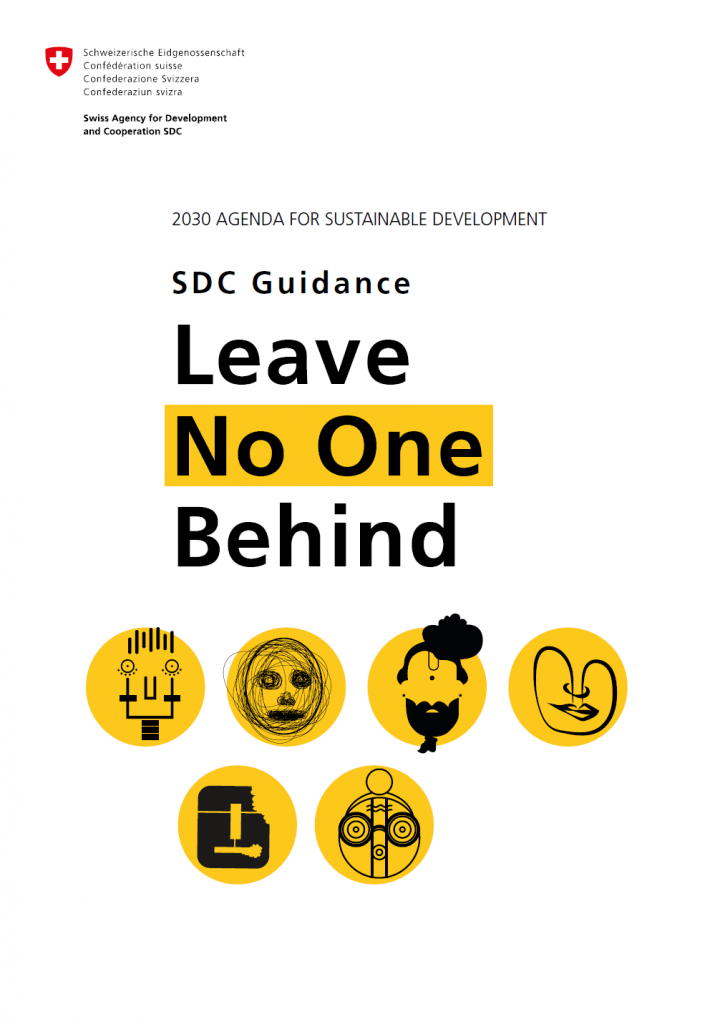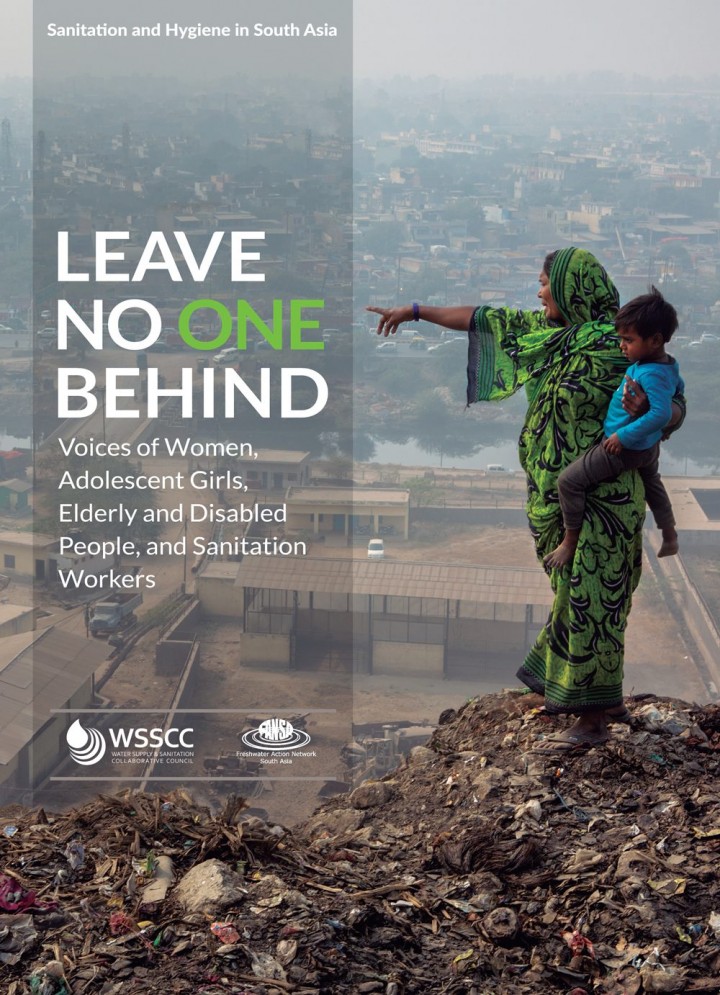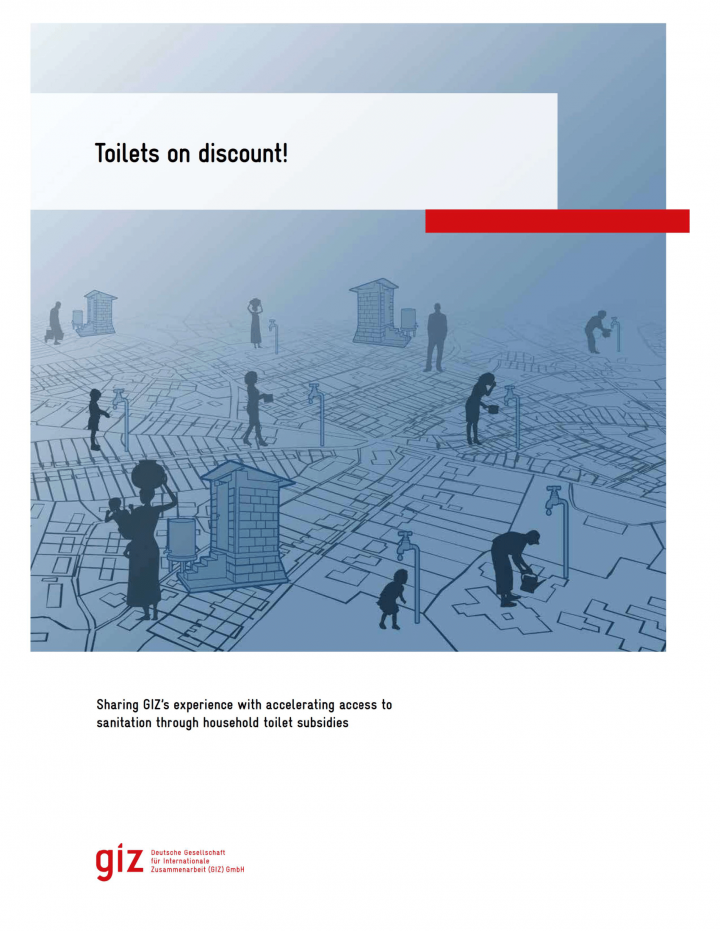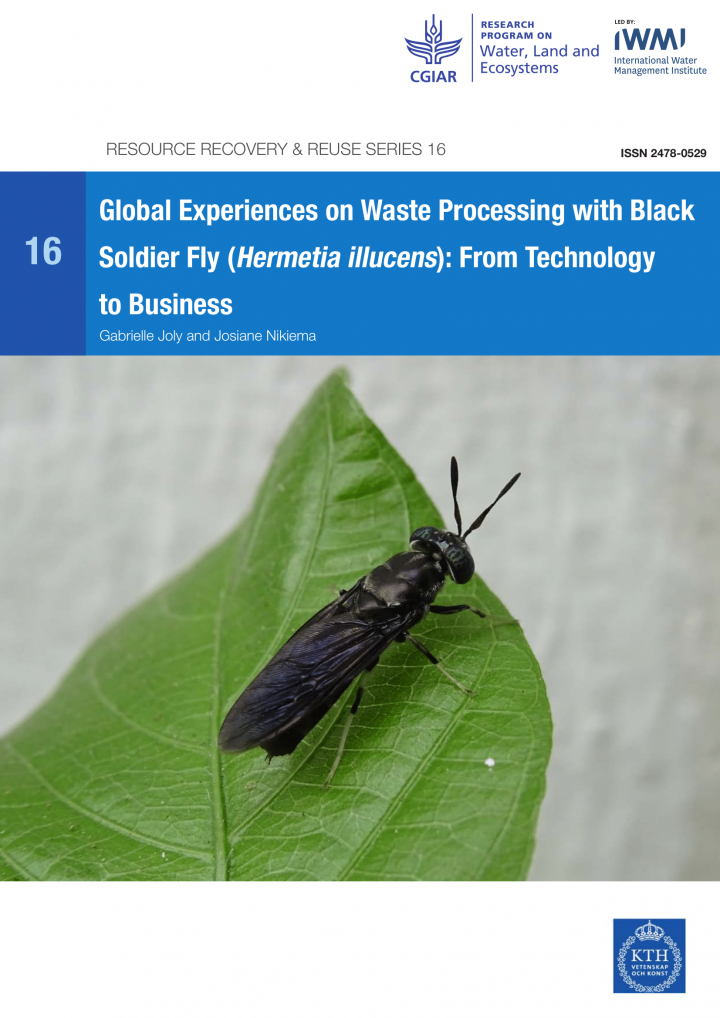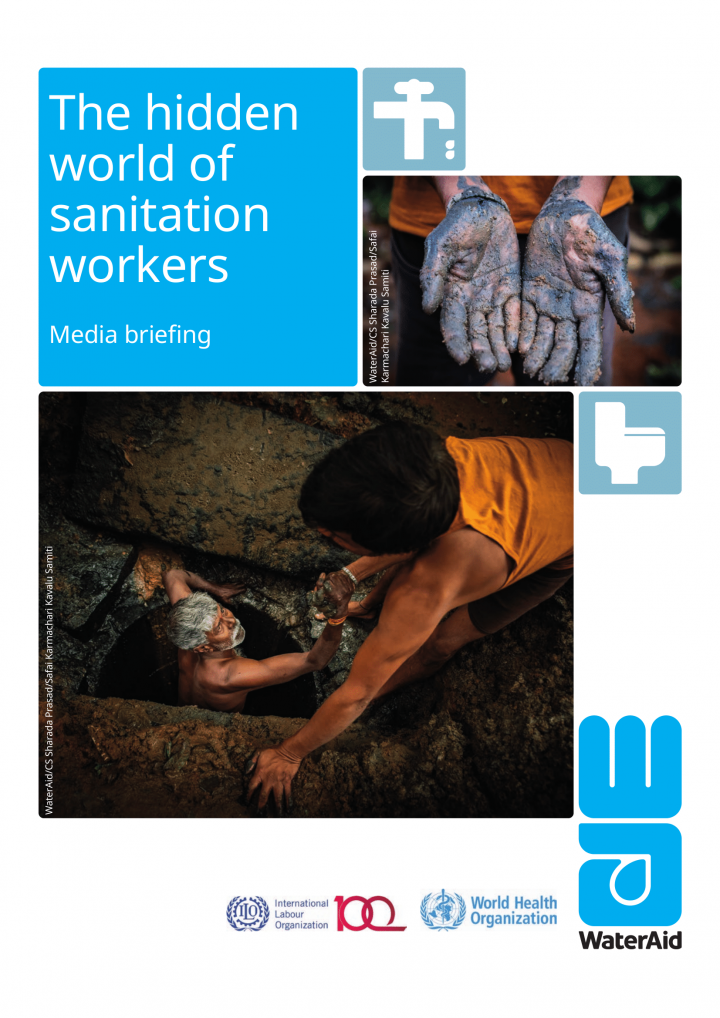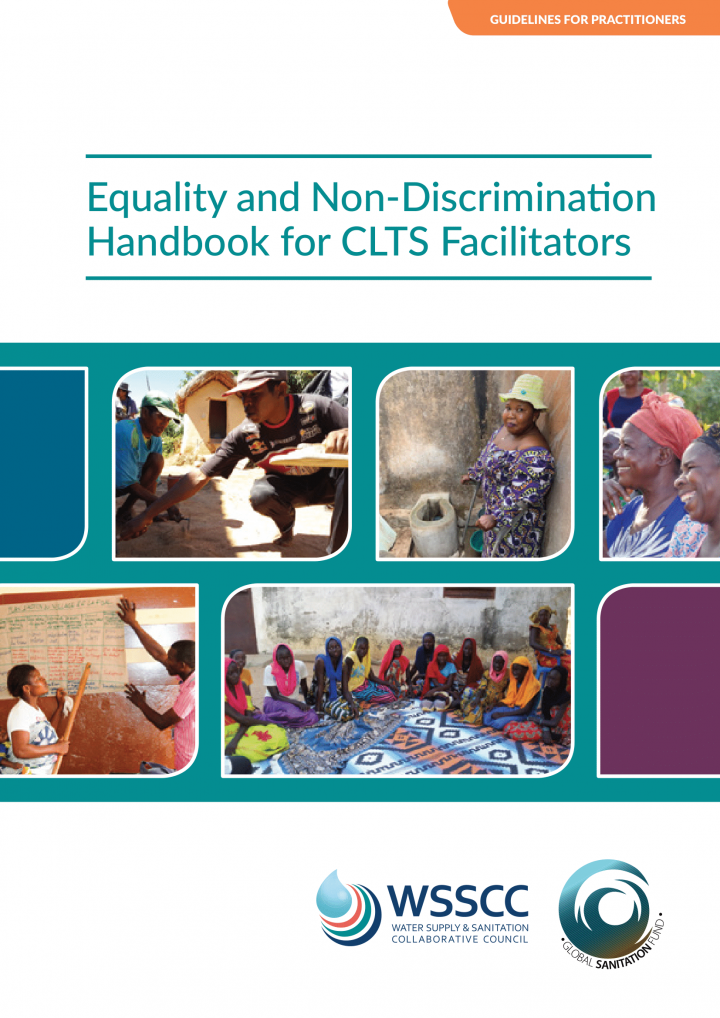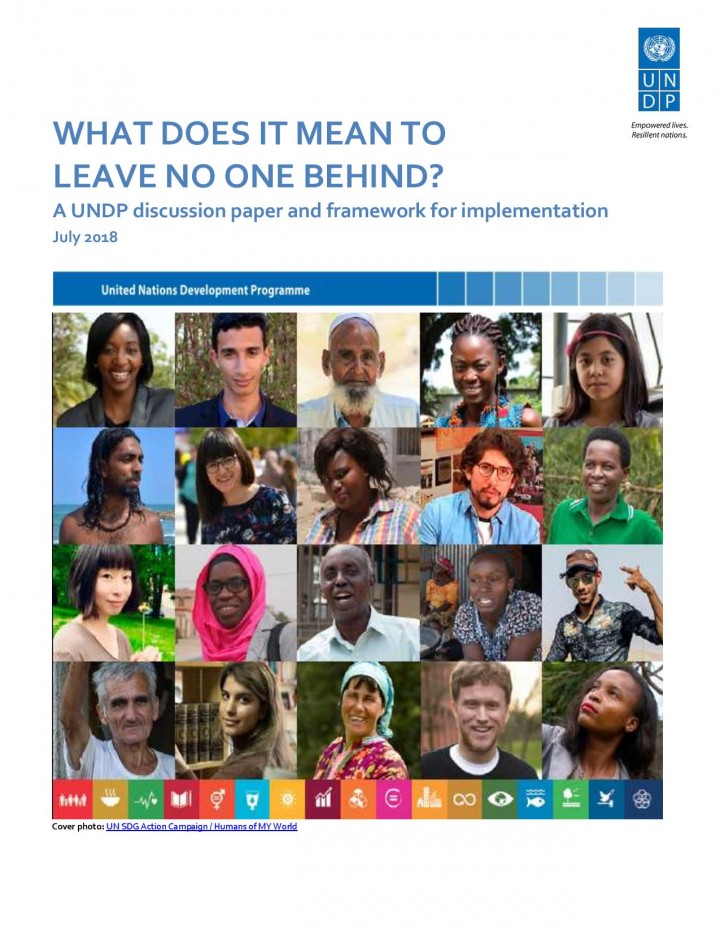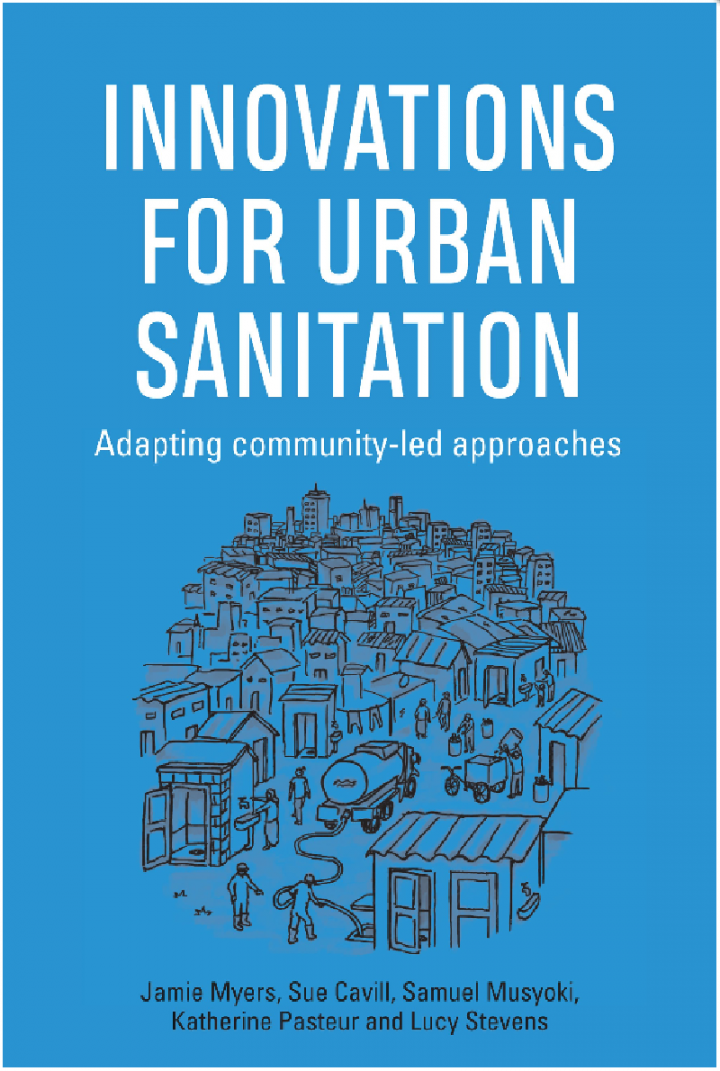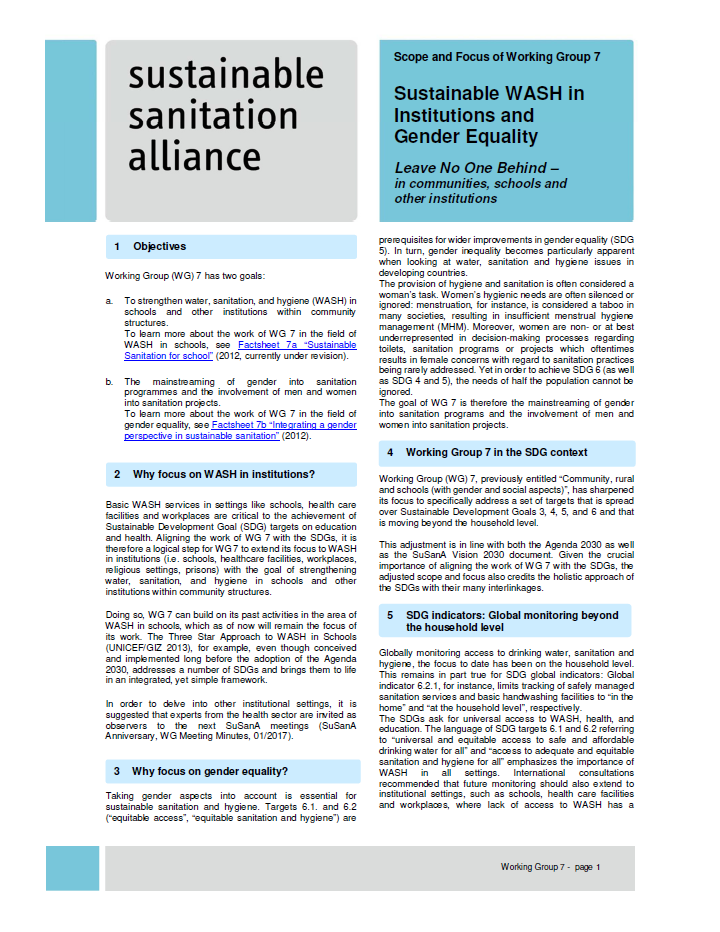Water for Women (2022) Leaving No One Behind: Experiences from Water for Women
Developed as part of a dedicated initiative under Water for Women’s Learning Agenda, this report is a synthesis of insights from 16 water, sanitation and hygiene (WASH) projects being delivered by partner civil society organisations (CSOs). The report draws lessons from and syntheses CSO self-assessments on the approaches they pursue to ensure no one is left behind, structured by: • Who CSOs identify as being […]
Bronwyn Powell; Gabrielle Halcrow (2022) Leaving No One Behind: Summary of Lessons from Water for Women
A leave no one behind (LNOB) approach in water, sanitation and hygiene (WASH) reduces marginalisation and exclusion by identifying and addressing intersecting forms of disadvantage and inequality. LNOB approaches aim to reach many marginalised people across large areas and through policy, and to transform beliefs, norms and values that contribute to discrimination and people being left behind. Water for Women civil society organisation (CSO) partners […]
(2022) Menstrual Health and Hygiene - Leave No One Behind in South Asia
“Achieving menstrual health requires access to information about the menstrual cycle and self-care, materials, water and sanitation facilities and services to care for the body during menstruation, access to timely diagnosis, care and treatment for menstrual discomforts and disorders, a positive and respectful environment free from stigma, and the freedom to participate in all spheres of life throughout the menstrual cycle” (Hennegan et al, 2021) Remarkable […]
WSSCC (2019) Equality and Non-Discrimination Handbook for CLTS Facilitators
The Equality and Non-discrimination (EQND) and Community-led Total Sanitation (CLTS) Handbook provides practical guidance for ensuring that behaviour change interventions leave no one behind. Drawing on experience from across the sector, this handbook is specifically targeted towards those implementing or supervising CLTS interventions at the community level. Key features include a summary of EQND principles, step-by-step guidance on applying these principles during pre-triggering, triggering meetings, […]
WSSCC (2019) Consultation on the Contribution of Swachh Bhaarat Mission towards Achieving SDG 6 in India
Voices of youth, women, older persons, persons with disabilities, persons living with HIV, transgenders and LGBTIQ, sex workers, manual scavengers, Dalits, Adivasis, farmers, urban shanty dwellers, urban homeless, migrants and refugees. Leave No One behind is the core principle of the SDGs and the 2030 Agenda. A consultation was held in India in late 2019 involving 14 groups identified by Niti Aayog as the furthest […]
Gerlach, E., Koeberlein, M., Brandt, A. (2020) Sanitation for Millions - Inclusive WASH Activities A Documentation
‘Leave no one behind’ is at the core of the Sustainable Development Goals (SDGs). Leave no one behind means for Sanitation for Millions that everyone, in any inhabited place, has access to a safely managed sanitation facilities and/or safe (hand-) hygiene, and thus can fulfil his/her WASH needs adequately and with dignity. Yet, as per WHO and UNICEF still more than 4.2 billion people suffer […]
Morgan, P. (2020) My Garden Laboratory Experiments in technical approaches to rural water supply, sanitation and hygiene carried out in my garden and home and then in the world beyond
There is something about being an experimenter and a scientist that never quite fades despite ones age or the fact that, as the years pass, as one gets older, the brain and the body never quite functions as efficiently as it used to do. Having been a student of Zoology in my early years and trained in the scientific method of a bygone era (1960’s) […]
Swiss Agency for Development and Cooperation (SDC) (2020) Thematic Working Aid “Leave no one behind in practice: Water, Sanitation & Hygiene” by SDC (in English and French)
The 2030 Agenda for Sustainable Development recognises “that eradicating poverty in all its forms and dimensions, including extreme poverty, is the greatest global challenge and an indispensable requirement for sustainable development”. In adopting this Agenda, the international community pledged to leave no one behind, to see to it that the Goals and targets are met for all nations and peoples and for all segments of […]
WSSCC, FANSA (2015) Leave No One Behind - Voices of Women, Adolescent Girls, Elderly and Disabled People, and Sanitation Workers
This publication summarizes the sanitation and hygiene hopes and aspirations of thousands of women and men of different ages and physical ability, across rural and urban areas in eight South Asian countries. In these countries, over a billion people are without safe sanitation. They represent individuals and groups rarely heard because they are seldom asked what their constraints are, what they need, how they cope […]
Mbalo, D., Rossmann, R. (2019) Toilets on discount - Sharing GIZ’s experience with accelerating access to sanitation through household toilet subsidies
The debate on subsidies has recently resurfaced in the context of the ambitious Sustainable Development Goal to achieve universal access to safely managed sanitation and the very significant funding gap to achieve this. The water and sanitation sector has always been highly subsidized, yet those subsidies mostly flow into support for existing customers rather than extension of services to the underserved. The World Bank’s recent […]
Joly, G., Nikiema, J. (2019) Global Experiences on Waste Processing with Black Soldier Fly (Hermetia illucens): From Technology to Business
The black soldier fly (BSF) can cope with a wide range of environmental conditions and the adult fly is not a vector of disease. BSF larvae can consume different organic materials, including various organic wastes generated in large volumes within urban areas. By doing so, they reduce waste volume, grow into a protein-rich biomass and leave behind a nutrientrich residue. The harvested larvae can then be […]
WaterAid, ILO, World Bank, WHO (2019) The hidden world of sanitation workers - Media briefing (in English, French, Portuguese and Spanish)
Every year, the human race produces over 350 million tonnes of poo – that’s enough to fill 140,000 Olympic swimming pools! Unless that human waste is properly dealt with, every single gram will pose a significant health risk to us and our planet. Ensuring that our contact with human waste ends when we leave the toilet is one of the most important jobs in society, and […]
WSSCC (2019) Equality and Non-Discrimination - Handbook for CLTS Facilitators
The Equality and Non-discrimination (EQND) and Community-led Total Sanitation (CLTS) Handbook provides practical guidance for ensuring that behaviour change interventions leave no one behind. Drawing on experience from across the sector, this handbook is specifically targeted towards those implementing or supervising CLTS interventions at the community level. Key features include a summary of EQND principles, step-by-step guidance on applying these principles during pre-triggering, triggering meetings, […]
UNDP (2018) What does it mean to leave no one behind? A UNDP discussion paper and framework for implementation
With the adoption of the 2030 Agenda, UN Member States pledged to ensure “no one will be left behind” and to “endeavour to reach the furthest behind first”. This paper advances a framework that governments and stakeholders can use to act on their pledge in a way that enables and accelerates progress to achieve the Sustainable Development Goals (SDGs). It also seeks to inform the manner […]
Myers, J., Cavill, S., Musyoki, S., Pasteur, K., Stevens, L. (2018) Innovations for Urban Sanitation Adapting Community-led Approaches
Over half the world’s population now lives in urban areas and a large proportion of them lives without improved sanitation. Efforts to tackle open defecation in rural areas has been led by the Community-led Total Sanitation (CLTS) movement. But how can the community mobilization techniques of CLTS be adapted to the more complex situations and transient populations in urban areas? How can landlords as well […]
Abraham, B., Monse, B., Schlenk, J. & Wendland, C. (2018) Sustainable WASH in Institutions and Gender Equality Scope and Focus of Working Group 7
The scope and focus document of SuSanA Working Group (WG) 7 Sustainable WASH in Institutions and Gender Equality (Leave No One Behind – in communities, schools and other institutions) WG 7 has two goals: a. To strengthen water, sanitation, and hygiene (WASH) in schools and other institutions within community structures. To learn more about the work of WG 7 in the field of WASH in schools, see Factsheet […]
